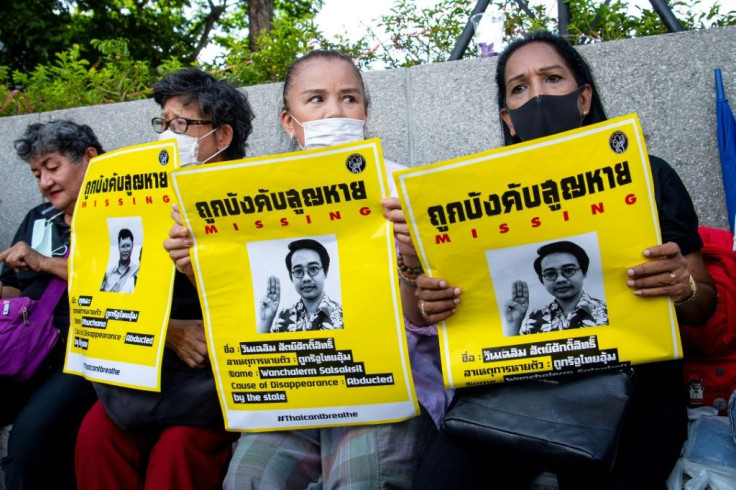Families Of 'Disappeared' Thai Activists Plead For Closure

Relatives of missing Thai activists pleaded Thursday for a long-stalled bill criminalising political disappearances to be made into law, as calls for accountability grow louder from a burgeoning youth-led pro-democracy movement.
Thailand has seen weeks of near-daily protests by students demanding an overhaul of the military-aligned government and reforms to the monarchy -- long a taboo subject in the kingdom.
One of the catalysts for the movement was the disappearance in June of Wanchalearm Satsaksit, a pro-democracy activist self-exiled in Cambodia who was allegedly snatched off the streets.
At recent protests students have displayed posters bearing his image -- as well as those of other activists whose disappearances over the years have gone unsolved.
"I will not let this story be silenced or forgotten," his older sister Sitanan Satsaksit said Thursday.
Speaking at an event in Bangkok to mark the International Day of Victims of Enforced Disappearances, Sitanan said there had been "no progress" from the Thai and Cambodian authorities in the nearly three months since her brother's disappearance.
"We are in the dark," she said.
The United Nations has recorded at least 82 cases of enforced disappearances in Thailand since 1980, but experts say the true figure could be higher.
Rights activists accuse Thai authorities of being involved, but perpetrators are rarely -- if ever -- brought to justice.
A draft law on criminalising torture and enforced disappearances has stalled for more than a decade.
"If we have this law, it can be a mechanism for me, for political activists, so that they will be protected," Sitanan said.
Seated around her were family members of other prominent missing activists.
"It is painful to recognise that I might never find my son again," said Kanya Theerawut, as she cried. "He is like a needle in an ocean."
Her son Siam was accused of insulting the powerful monarchy and fled to Vietnam, pressed into self-exile like so many other pro-democracy activists and academics after the 2014 coup by an arch-royalist military.
In May 2019 rights groups said Siam was arrested in Vietnam and returned to Thailand, but authorities denied he was in their custody.
Former junta chief Prayut Chan-O-Cha was voted back into power in last year's polls, which were governed under a military-scripted constitution that analysts say tilted the win in his party's favour.
Protesters are calling for his resignation and a rewrite of the constitution, and are also demanding an end to harassment of activists.
"The majority of the society sees that all we want is general democracy," said Jutatip Sirikan, a rising student leader who said her grandfather -- politician Tieng Sirikan -- disappeared in 1952.
"We don't want to be under a dictatorship."
© Copyright AFP {{Year}}. All rights reserved.





















